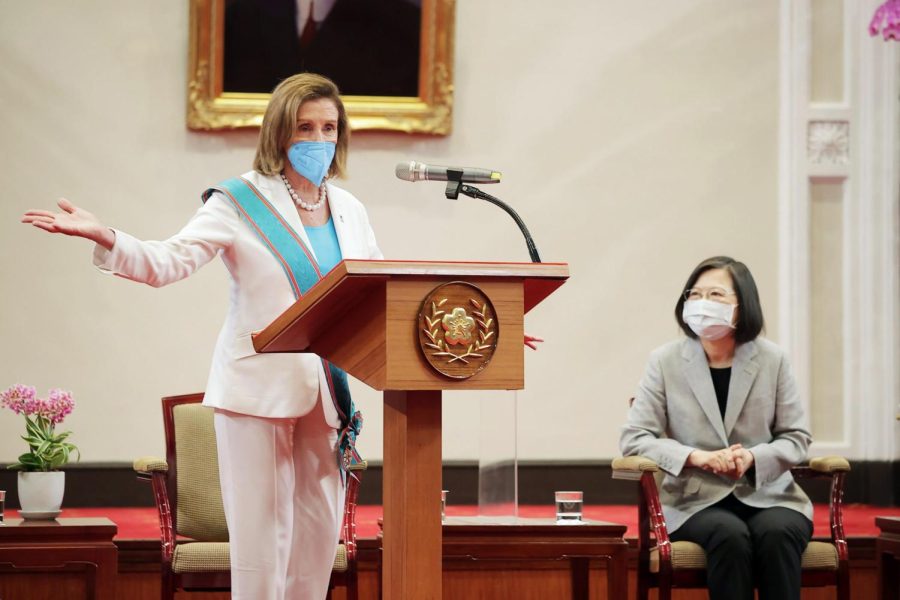Tensions in Taiwan: nobody benefits
Photo courtesy of Associated Press
Pelosi speaks during meeting with Taiwanese President, Tsai Ing-wen, right, in Taipei, Taiwan
September 1, 2022
Tensions in the Taiwan Strait are running high, with the U.S. again taunting China over the Taiwan issue. Beijing says Washington violated all three Sino-US joint communiqués. So who is threatening regional stability, and why is it a big deal?
China has restarted live shooting exercises in the waters and airspace of the island of Taiwan to protest the visit of five members of the US Congress. Military exercises began earlier this month when House Speaker Nancy Pelosi took a trip to the island. Beijing says the response is a legitimate act of defense, but Washington has called it an “overreaction.” Pelosi’s visit stirred controversy in the States as well, costing taxpayers upwards of 90 million dollars and putting national security at risk in a time when it is widely agreed that the government’s focus should be domestic. After all, in a time of record inflation and global shortages, what interest do the American people have in agitating yet another global superpower?
China has accused the United States of violating the spirit of the three joint communiqués. The third was signed almost exactly 40 years ago; Washington promised that it would not pursue a long-term policy of selling weapons to Taiwan (but did not cite a specific date to end sales). This laid the foundations for peace and stability across the Taiwan Strait. But, unfortunately, as the decades passed, arms sales increased.
Over the past 40 years, the United States has sold a total of nearly $70 billion worth of weapons to Taiwan, advanced equipment, and systems such as Patriot missile systems, self-propelled artillery, and ammunition delivery vehicles. In the words of the Institute of Taiwan Studies at the Chinese Academy of Social Sciences, China’s foremost academic research institute, “It is difficult to gauge how ‘defensive’ the US military equipment has been offered to Taiwan in recent years… If Taiwan receives the weapons in accordance with America’s strategy, it’s being leveraged by the U.S.” It must be noted, however, that the United States cannot formally recognize Taiwan as sovereign, as the United Nations Resolution 2758 made clear in 1971 that “Taiwan as a province of China is completely not qualified and has no right to participate in [the UN]” as an independent government.
While conflict in a region with such a long history cannot be reduced to one or two factors, the interests of the United States seem relatively clear. For one, Taiwan produces 66% of global semiconductors, the small piece of technology that allows everything from our smartphones to desktop computers to run. Although the one-China policy has been understood to include Taiwan with mainland China since as far back as the 1940’s, and has been the basis of US-China relations since at least the 70’s, the United States can simply not allow Taiwan to fall outside of its sphere of influence now. Doing so would put the U.S’ ability to produce technologically advanced equipment at risk, while granting China a near-monopoly of semiconductor production.
Secondly, as the U.S. midterm elections approach, politicians have repeatedly played Taiwan’s card for personal gain. Grandstanding to appear “tough on China ” remains in the interest of politicians, especially democrats, who have had a lackluster presidential term so far. But China has been direct. It urged the U.S. to stop undermining the one-China principle and said that the reunification process cannot be interrupted.
It is best not to mince words about this subject; when it comes down to it, China is correct. In the (rather informal) words of former president Donald Trump when speaking to an unnamed Republican senator in 2019, “Taiwan is like two feet from China. We are eight thousand miles away. If they invade, there isn’t a [expletive] thing we can do about it.” Reunification with mainland China using the “one country, two systems” policy seems like an inevitability. Taiwan has neither the military capacity, international backing nor ideological thoroughness to sponsor a unilateral independence movement from China. According to polling following Pelosi’s visit, those who seek complete unification with China or complete independence are both extremes, with most Taiwanese supporting a general maintenance of the status quo with a slight preference toward unique, independent governance. Beijing understands this, and makes note of the unique Taiwanese culture and opinion that will be respected in the “one China, two systems” style of government. Either way, the hardline separatists of Taiwan will find it difficult to get their way.
China maintains that Taiwan’s reintegration with the People’s Republic of China is a continuation of a legally recognized process to reunite the Chinese people under a common identity and goal of prosperity. Whether or not this is true is up for debate, but if China truly does pose a threat to the Taiwanese people, the worst thing the U.S. could do for them is poke the bear. The people of Taiwan do not want to risk a war that will likely lead to an outcome less favorable than pursuing peaceful reintegration.
To China, Taiwan represents something: an unshaking affirmation of the unity of the Chinese people. In 1894, China was forced to give up Taiwan to imperial Japan, eventually winning the land back in 1943, and the once lost Chinese territory was internationally recognized as Chinese again through the Cairo Proclamation. In 1949, the Chinese civil war ended, defeated forces of the previous regime fled to Taiwan, and the People’s Republic of China became the official government of all of China, including Taiwan itself. The People’s Republic won’t let Taiwan fall into the hands of its enemies again, and can not risk being surrounded by an official U.S. ally in the South China Sea. To the United States, Taiwan is a piece of a much larger geopolitical puzzle to control a foreign adversary, and is unfortunately putting the peace across the Taiwan Strait at risk. Pelosi’s visit and the continued provocations by U.S. officials are in the interest of nobody, and may very well accelerate the reunification of China by force.



